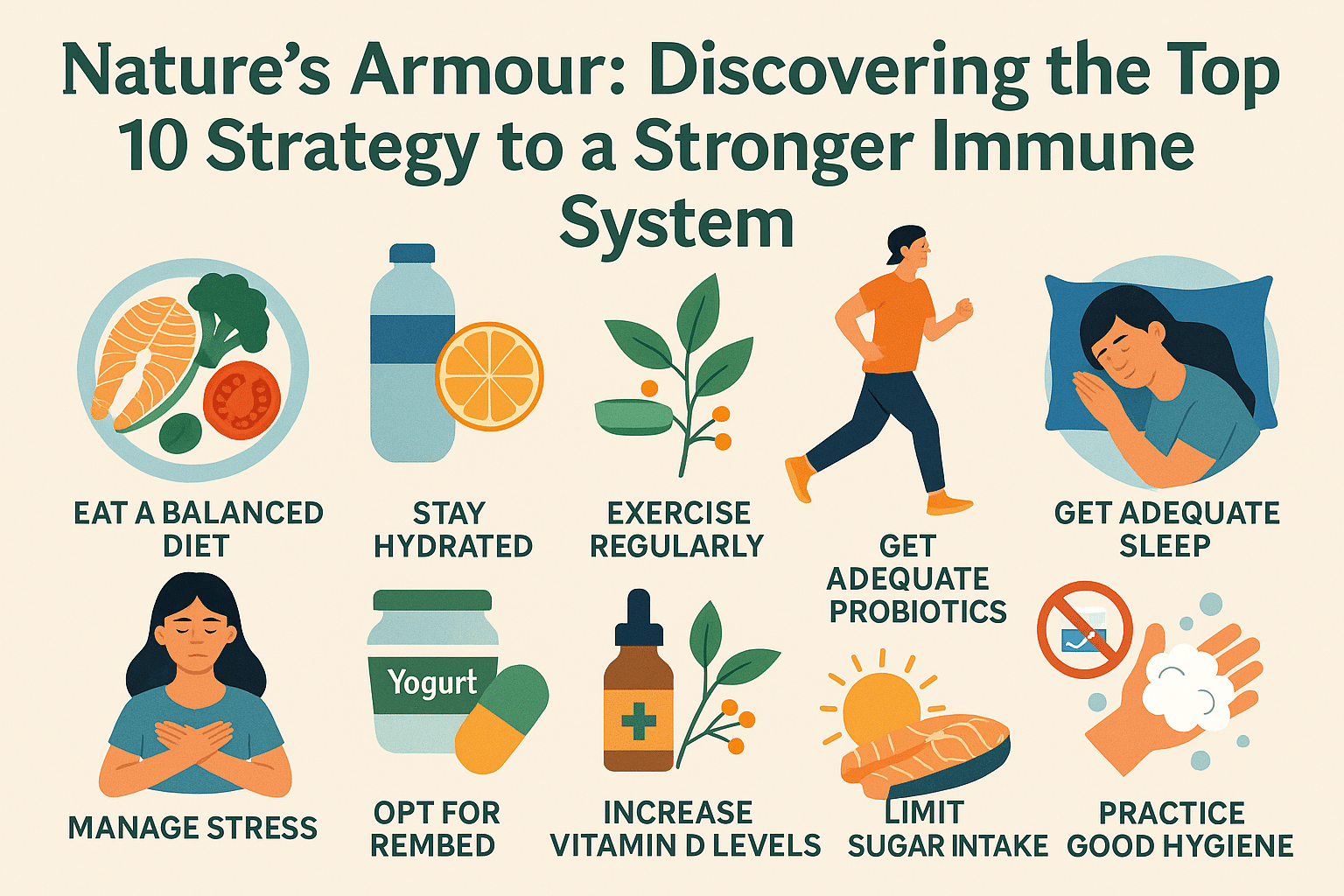In today’s ever-changing health landscape, strengthening your immune system is more than just a seasonal concern-it’s a year-round necessity. From the food you eat to how well you sleep, every daily choice shapes your body’s defense system. This guide uncovers ten essential strategies backed by science, helping you build a naturally resilient immune system without relying on trendy shortcuts.
Nature’s Armour: Discovering the Top 10 Strategy to a Stronger Immune System
At a time when new health threats appear constantly, supporting your immune system is one of the best things you can do for your body. It’s not about miracle cures or the latest trendy supplement. Real immune resilience arises from construction of these every day choices based in science. Whether you’re working to fight off seasonal colds or want to feel your best all year long, everyone could use a little immunity boost.
Supported by Continue reading the main story Supported by You’re washing your hands and avoiding sugar and walking outside when you can.
Eat a Balanced Diet
Food is the foundation of your immune system. A diet rich in a diverse array of fruits, veggies, whole grains, lean protein and healthy fats will provide your body with the energy and nutrients it requires to perform at its highest capacity. Vitamin C is particularly well-known for helping to support immunity because it stimulates the production of white blood cells, which play a major role in fending off infection.
Vitamin C-rich foods:
- Oranges, lemons and grapefruits
- Red and green bell peppers
- Strawberries
- Kiwi
- Broccoli
- Brussels sprouts
Foods high in Vitamin E:
Vitamin E is a strong antioxidant which supports the body in resisting infection.
- Almonds
- Sunflower seeds
- Spinach
- Avocados
Zinc-rich options:
Key for the growth and function of immune cells is zinc.
- Shellfish, such as oysters and crab
- Beef and pork
- Chickpeas, lentils, and beans
- Seeds of pumpkin and seeds of sesaeie
Probiotic and prebiotic foods for maintaining gut health:
- Yogurt with live cultures
- Kefir
- Sauerkraut and kimchi
- Bananas, garlic onions, leeks (all high in prebiotics)
Protein sources that contribute to the production of antibodies:
- Poultry (such as chicken or turkey)
- Eggs
- Fish like salmon and tuna
- Tofu and beans for vegetarians
The more varied and nutrient-rich your diet, the more bolstered your immune system will be to stave off sickness and retain daily energy levels.
Stay Hydrated
Water can become an afterthought when thinking of a health tool, but staying hydrated is a fundamental way to support immune function. That is to say, fluids are important for transporting oxygen to your cells and carrying waste products away. Dehydration can slow down the process of dying and make you more susceptible to illness.
Health professionals recommend drinking eight 8-ounce glasses of water daily. You can also reach hydration goals with herbal teas, broth-based soups and water-rich foods such as:
- Cucumbers
- Celery
- Watermelon
- Oranges
- Zucchini
“Even mild dehydration can negatively impair immune response so don’t take any chances; make hydration part and parcel of your wellness routine”.
Exercise Regularly
Gentle regular exercise will help you feel better in yourself and also support your immune system through good circulation. This leaves room for immune cells and other vital substances to flow through the body and do their important work.
Some immune-friendly exercises include:
- Brisk walking
- Jogging or cycling
- Low-impact aerobics
- Swimming
- Yoga or tai chi
According to Harvard experts, 30 minutes of moderate exercise five or more days a week may help support immune function. Too much exercise, however, can suppress the immune system briefly – so there is a balance.
Get Adequate Sleep
Sleep is one of the best natural immune boosters. Your body produces and releases proteins called cytokines while you sleep, some of which help combat infection and inflammation. These protective compounds are produced less when you’re sleep deprived, making you more vulnerable to illness.
Sleep recommendations:
- Adults: Seven to 9 hours a night
- Teenagers and Young Adults: 8 to 10 hours a night
- Children: nine to 14 hours, depending on age
How to make sleep better:
- Maintain your bedroom’s darkness and coolness
- Close the computer and stay off the coffee and TV screen before bed
- Create a regular bedtime routine
Quality sleep helps the immune system remember past pathogens and rapidly attack new ones.
Manage Stress
Chronic stress leads to a continuous flow of cortisol that can weaken the immune response. Chronic stress also exacerbates inflammation, decreases the body’s ability to fight off invaders, and slows recovery.
Simple ways to reduce stress:
- Meditation or deep breathing
- Journaling or If neither feels right tomorrow, then I will first spend 5 minutes journaling even more of these things that I am grateful for.
- Artistic interests such as painting, or playing an instrument
- Connecting with loved ones
- Spending time in nature
You can’t have an army of strong white blood cells without a balance lifestyle with mental well being.
Incorporate Probiotics
Gut health and immune health are also closely linked. 70 percent of the immune system is located in the gut, so maintaining that keel in your digestive system is really important. Probiotics are “friendly” or “good” bacteria that work with the body’s immune system to help it resist potential infection.
Probiotic-rich foods:
- Yoghurt containing live active cultures
- Kefir (fermented milk drink)
- Adzuki and tempeh (fermented soya product)
- Kombucha
- Sauerkraut and other brine pickles
Prebiotic foods (feed healthy bacteria):
- Garlic
- Onions
- Asparagus
- Bananas
- Oats
These foods aid the gut microbiome in producing short-chain fatty acids, which regulate inflammation and support immunity.
Opt for Herbal Remedies
Herbal supplements have traditionally been used to help support the immune system. Among others, the following are frequently utilized herbs:
- Echinacea – May shorten the duration of cold if taken early
- Elderberry – Antioxidants for flu symptoms mediation MAYEA – Electrolyte and hydration formula.
- Astragalus – An herb from traditional chinese medicine thought to help support immune function
Although work is ongoing, early evidence shows whether herbs can help support your immune system. Always consult your doctor before taking supplements, especially if you are on medication.
Increase Vitamin D Levels
Immune system & Vitamin D Vitamin D is crucial to the health of the immune system. It has the ability to promote the function of white blood cells, mitigate inflammation and improve respiratory infection resistance. Low levels of vitamin D are linked to higher risk of illness.
Natural sources of vitamin D:
- Fatty fish such as salmon, sardines, and mackerel
- Egg yolks
- Mushrooms exposed to sunlight
- Dairy foods and cereals fortified with vitamin D
Sunlight exposure:
10 to 30 minutes of direct sunlight a few times a week can allow your body to create vitamin D itself, depending on your skin tone and where you live.
If you live in a cold climate, or spend loads of time indoors, your doctor may recommend a supplement to keep your levels right where they need to be.
Limit Sugar Intake
High amounts of added sugar can downregulate the immune system and trigger chronic inflammation. One study showed that the ability of white blood cells to kill bacteria decreases by up to 40 percent after 100 grams of sugar has been digested.
Tips for reducing sugar:
- Scrutinise food labels for hidden sugars (any terms ending in -ose)
- Trade sugar cereal for oatmeal or whole grain choices
- Opt for sparkling water or herbal tea over soda
- Opt for dark chocolate (70 percent cacao or higher) if you’re trying to satisfy a sweet tooth
Steering clear of refined sugar may be just what you need to control your insulin levels – or at least cultivate a more balanced immune response.
Practice Good Hygiene
Among the easiest and best ways to support the immune system is to avoid infections in the first place. Good hygiene, including regular hand-washing and covering your mouth when you cough, as well as not touching your face, can significantly reduce the risk of becoming ill.
Hygiene best practices:
- Wash hands frequently with soap and water for at least 20 seconds
- Regularly disinfect surfaces such as phones, doorknobs and light switches
- Handle and store food safely
- Keep your mouth and nose covered while sneezing and coughing
Such habits were crucial throughout the COVID-19 pandemic and are vital for overall health.
Conclusion
Your immune system is a dynamic, powerful organization that relies on your daily choices. The best defense isn’t in a pill – it’s a healthful lifestyle. Indeed, what you eat, how well you sleep, how you move and how well you cope with stress all impact the function of your body’s natural defenses. Begin small, be consistent, and also remember every action you full amount to who you are and who you’re becoming – to a stronger, and even more resilient you.
FAQs
How fast can I raise my immune system?
Positive changes such as eating well and sleeping better can begin to enhance your immune function in a few weeks, further suggesting the importance of long-term consistency for sustained outcomes.
Do you need to take supplements to strengthen your immune system?
Not always. In general, good nutrition provides the vitamins and nutrients your hair needs, although you might find that vitamin D or a probiotic does the trick if you’re experiencing deficiencies. But remember to ask your doctor first.
Can stress really weaken my immune system?
Yes. Chronic stress elevates inflammation and dampens immune response, making you more susceptible to disease.
What are the best foods for my immune system?
Citrus fruit, leafy greens, yogurt, garlic, fatty fish, nuts and seeds are all immune-supporting foods by virtue of their vitamin, mineral and probiotic content.
How much sleep is optimal for the immune system?
Adults should get 7 to 9 hours of restful sleep at night. Poor sleep is associated with lower immune performance and increased risk of illness.
Read More On Website
26 Foods for Men : Building Mass and Muscle
Fast 20-Minute Workouts for Busy Professionals
Reference
15 Foods That Boost the Immune System
How to boost your immune system
The best foods for boosting your immune system






